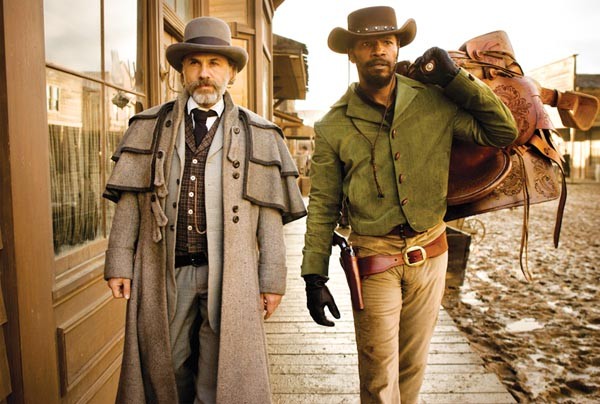The 1966 spaghetti Western Django spurred dozens of cinematic imitations and spin-offs, mostly of the grade-B or lower variety. So it's no surprise that such an admirer and self-conscious re-imaginer of junky genre fare as Quentin Tarantino would get around to his own lurid version, Django Unchained.
The story begins in 1858 Texas (helpfully subtitled on screen as being before the Civil War, in case you missed history). A German bounty hunter (Christoph Walz) frees a slave named Django (Jamie Foxx), whom he hires to help him track down his former overseer. Django agrees, hoping reunite with his still-enslaved wife. The pair makes a good team, contract-killing their way across the West, before winding up at the Mississippi plantation of Calvin Candie (Leonardo DiCaprio). There, various cons — and ultimately, some ultra-violence — are employed to secure Mrs. Django (Kerry Washington).
This Django is a hybrid of a spaghetti Western and blaxploitation revenge quest, intercut with a fair amount of humor and graphic violence. (Some of the violence is meant to be laughed at, while other scenes — such as a slave being torn apart by a pack of dogs — are designed to discomfit.)
It's everything you'd expect from a Tarantino film: button-pushing, too long and self-indulgent. It's a symphony of n-words — also, f-words, mf-words and s-words. It features roster of good, bad and hammy actors in roles small and large. Plus Samuel L. Jackson, in one of his out-there roles. It has a laugh-out-loud, white-sheeted night-riders scene, and Jim Croce's 1970s soft-rock hit "I Got a Name" underscores Django's transformation from slave to free man.
With an enthusiastic Tarantino behind the wheel, the film careens wildly all over the road. For a while, the swerving is entertaining, but it grows wearying. Some thought has gone into making this film — a filmmaker doesn't choose "slavery in America" willy-nilly. Yet Django never steers a clear path toward any coherent points, instead offering short-hop detours, many of them contradictory.















